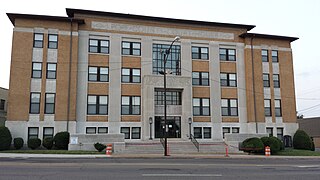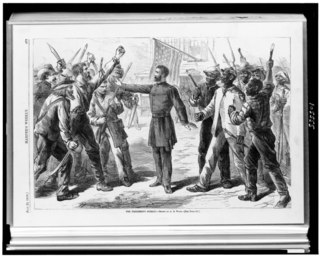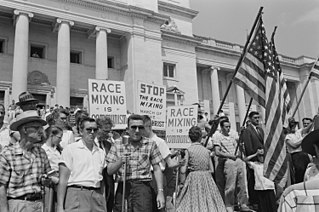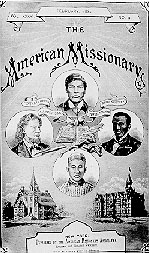
Pope County is a county in the U.S. state of Arkansas. As of the 2020 census, the population was 63,381. The county seat is Russellville. The county was formed on November 2, 1829, from a portion of Crawford County and named for John Pope, the third governor of the Arkansas Territory. Pope County was the nineteenth county formed. The county's borders changed eighteen times in the 19th century with the creation of new counties and adjustments between counties. The current boundaries were set on 8 March 1877.
The American Statistical Association (ASA) is the main professional organization for statisticians and related professionals in the United States. It was founded in Boston, Massachusetts on November 27, 1839, and is the second oldest continuously operating professional society in the US. The ASA services statisticians, quantitative scientists, and users of statistics across many academic areas and applications. The association publishes a variety of journals and sponsors several international conferences every year.

The Bureau of Refugees, Freedmen, and Abandoned Lands, usually referred to as simply the Freedmen's Bureau, was an agency of early Reconstruction, assisting freedmen in the South. It was established on March 3, 1865, and operated briefly as a U.S. government agency, from 1865 to 1872, after the American Civil War, to direct "provisions, clothing, and fuel...for the immediate and temporary shelter and supply of destitute and suffering refugees and freedmen and their wives and children".

The Women's Emergency Committee to Open Our Schools (WEC) was an organization formed by a group of socially prominent white women in the city of Little Rock, Arkansas during the Little Rock Crisis in 1958. The organization advocated for the integration of the Little Rock public school system and was a major obstacle to Governor Orval Faubus's efforts to prevent racial integration. The women spoke out in favor of a special election to remove segregationists from the Little Rock school board.

Mankind Quarterly is a peer-reviewed journal that has been described as a "cornerstone of the scientific racism establishment", a "white supremacist journal", and "a pseudo-scholarly outlet for promoting racial inequality". It covers physical and cultural anthropology, including human evolution, intelligence, ethnography, linguistics, mythology, archaeology, and biology. It is published by the Ulster Institute for Social Research, which is presided over by Richard Lynn.

The American Missionary Association (AMA) was a Protestant-based abolitionist group founded on September 3, 1846 in Albany, New York. The main purpose of the organization was abolition of slavery, education of African Americans, promotion of racial equality, and spreading Christian values. Its members and leaders were of both races; The Association was chiefly sponsored by the Congregationalist churches in New England. The main goals were to abolish slavery, provide education to African Americans, and promote racial equality for free Blacks. The AMA played a significant role in several key historical events and movements, including the Civil War, Reconstruction, and the Civil Rights Movement.
The Texas State Historical Association (TSHA) is a non-profit educational organization, dedicated to documenting the history of Texas. It was founded in Austin, Texas, on March 2, 1897. In November 2008, the TSHA moved its offices from Austin to the University of North Texas in Denton, Texas. In 2015, the offices were relocated again to the University of Texas at Austin.

This is a selected bibliography of the main scholarly books and articles of Reconstruction, the period after the American Civil War, 1863–1877.

The Journal of Modern History is a quarterly peer-reviewed academic journal covering European intellectual, political, and cultural history, published by the University of Chicago Press. Established in 1929, the journal covers events from approximately 1500 to the present, with a geographical scope extending from the United Kingdom through the European continent, including Russia and the Balkans.

The history of Arkansas began millennia ago when humans first crossed into North America. Many tribes used Arkansas as their hunting lands but the main tribe was the Quapaw, who settled in the Arkansas River delta upon moving south from Illinois. Early French explorers gave the territory its name, a corruption of Akansea, which is a phonetic spelling from the Illinois language word for the Quapaw. This phonetic heritage explains why "Arkansas" is pronounced so differently than the U.S. state of "Kansas" even though they share the same spelling.

The Little Rock Nine were a group of nine African American students enrolled in Little Rock Central High School in 1957. Their enrollment was followed by the Little Rock Crisis, in which the students were initially prevented from entering the racially segregated school by Orval Faubus, the Governor of Arkansas. They then attended after the intervention of President Dwight D. Eisenhower.
The Australian Association for Maritime History (AAMH) is an Australian maritime history organisation. It publishes a journal, a newsletter and organises conferences.

The Arkansas Historical Association is a historical society based at the University of Arkansas in Fayetteville, Arkansas.

Self-Taught: African American Education in Slavery and Freedom is a book that tells the history of African American self-education from slavery through the Reconstruction Era. It was written by history professor Heather Andrea Williams and published in 2007 by the University of North Carolina Press.

The 1892 Arkansas gubernatorial election was held on September 5, 1892.

The 1896 Arkansas gubernatorial election was held on September 7, 1896.

The 1898 Arkansas gubernatorial election was held on September 5, 1898. Incumbent Democratic Governor Daniel W. Jones defeated Republican nominee Henry F. Auten and Populist nominee W. Scott Morgan with 67.35% of the vote.

African Americans have played an essential role in the history of Arkansas, but their role has often been marginalized as they confronted a society and polity controlled by white supremacists. During the slavery era to 1865, they were considered property and were subjected to the harsh conditions of forced labor. After the Civil War and the passage of the 13th, 14th, and 15th Reconstuction Amendments to the U.S. Constitution, African Americans gained their freedom and the right to vote. However, the rise of Jim Crow laws in the 1890s and early 1900s led to a period of segregation and discrimination that lasted into the 1960s. Most were farmers, working their own property or poor sharecroppers on white-owned land, or very poor day laborers. By World War I, there was steady emigration from farms to nearby cities such as Little Rock and Memphis, as well as to St. Louis and Chicago.












